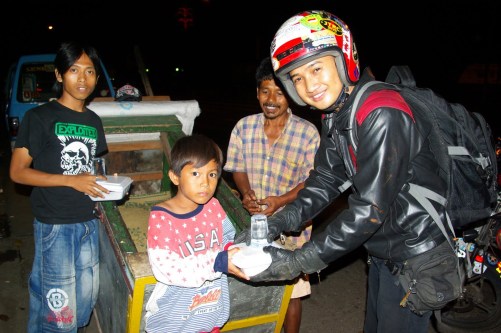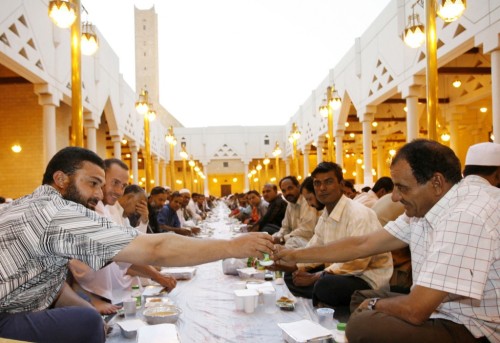
This year, Ramadan will be arrived in a matter of days (on May 26 approximately–which means today). The green attributes are installed in malls, restaurants, etc.. The ta’jil (read ‘takjil’) are made and served. Less work hours. Outdoors become very crowded, so as mosques–unfortunately it only occurred on the first week (for the mosque thing). And more. In this blog, I’m going to tell you unique things in Indonesia during Month of Ramadan.
- Sahur–waking people up and eating in early hours

Sahur actually means eat in the early hours (endowed before dawn). This tradition is originally unknown, but it is still maintained until now. Conducted at 2-3 AM, some residents go around their own residence by carrying torches and percussion instruments such as kentungan (made from bamboo or hollow wood), empty gallons, small bedug (drum made from goatskin), etc.. Then they shout, “Sahur… Sahur…” Although it is disturbing for other residents who are still asleep, they do this so that those who running the fast can wake up and have sahur.
Usually, people do sahur in their own house while watching a lot of TV shows that will accompany them. And aside from entertaining, the TV shows can be their inspirations for doing their own activity from morning until evening.

Sahur on the Road
There’s also an activity–which is as same as sahur–called Sahur on the Road (SOTR for short) that had been started since 2009. In this activity, volunteers distribute the food (usually rice box) for those who are less fortunate, and join them eating at the edge of the street. Unfortunately, according to some sources that I read, SOTR is actually not a sharing activity yet an entertainment activity–which can make authorities come and dismiss it.
- Ngabuburit–waiting the time for breaking the fast
In Sundanese, ngabuburit means waiting for dusk. But for Indonesians, ngabuburit means doing activities that we like/love while waiting the time for breaking the fast, such as reading, taking a walk, watching TV shows/movies, etc.. Ngabuburit usually starts from 4 PM until (usually) 6 PM–depending on what time you will break the fast. And for your information, ngabuburit is rarely found in other Muslim countries yet Indonesia.
- Distributing ta’jil
Ta’jil (عجّل) actually means a refreshment for the cancellation of fasting by eating/drinking something. But for Indonesians, ta’jil has a different meaning. Initially, ta’jil could only be found in mosque only. However, some communities, organizations, or institutions started to make ta’jil together and then, distribute them to people whom they meet on streets. Ta’jil in Indonesia can be vary, like spekkoek (a type of Indonesian layer cake; in Bahasa we called lapis legit), gruel (food consisting of some type of cereal–oat, wheat or rye flour, or rice–boiled in water or milk; in Bahasa we called bubur sumsum), ice jelly, kolak (an Indonesian dessert based on palm sugar or coconut sugar, coconut milk, and pandanus leaf), etc.. A shape of harmony and a wonderful sense of togetherness. If only my country always like this every day.
- Breaking the fast (together)

After the sound of bedug, time for breaking the fast begins. Usually, they start it with drinking then eating meals that had been served. Also, this activity serves as a place to stay in touch with old friends/relatives/co-workers. However, they must do the Shalat Maghrib (have a west prayer) after breaking the fast. And, for your information, most people do this at outdoors (like malls, restaurants, streets, etc.).
- Tarawih (تراويح)


This event is only available in Month of Ramadan and mostly found in Muslim countries–especially Indonesia. You can call it either ‘teraweh’ or ‘taraweh’ because it has the same meaning as ‘tarawih’. In this event, you will be read about 23 raka’āt (ركعات; read: raka’āh) and at the end of tarawih, some children will gather around the priest to ask for his autograph in their Ramadan Agenda.
- Shopping

Shopping Illustration
Usually during Month of Ramadan, people’s purchasing power will be increased thanks to the THR (Tunjangan Hari Raya; in English Religious Holiday Allowance) they receive before going back to hometown or taking holidays. And because of this, they will straight buy all things for the preparation for Eid Mubarak.
- Mudik–going back to hometown
Like ngabuburit, mudik is rarely found in other Muslim countries yet Indonesia. Usually, near the end of Month of Ramadan, most Muslim families will start packing and go to their hometown in the next day to reunite and stay in touch with their own families. Usually, they use public or private transport–depending on the situation. But certainly, the roads between provinces will be very jammed compared to the roads in the capital city, Jakarta.

Happy Fasting for my Muslim friends! 🙂
Well, those are the unique things in Indonesia during Month of Ramadan. Hope you guys like it! What are the unique things during Month of Ramadan in your country? Tell me in the Comment Section!
References (in Bahasa):
- https://www.facebook.com/permalink.php?id=323784210969701&story_fbid=887648361249947
- https://www.facebook.com/permalink.php?id=105461652931573&story_fbid=131893953621676
- https://id.linkedin.com/pulse/pengertian-takjilapa-itu-takjil-istilah-di-bulan-husnaeni-pane
- http://kepoan.com/2015/06/1931/ternyata-indonesia-memiliki-fakta-unik-selama-ramadhan-yuk-simak/
- https://blog.bukalapak.com/2016/05/kegiatan-di-bulan-ramadhan/
- http://papasemar.com/serba-serbi-ramadhan-11-hal-yang-hanya-terjadi-di-bulan-ramadhan-2/
- http://media.iyaa.com/article/2016/06/Ini-7-Tradisi-Unik-di-Indonesia-Saat-Bulan-Ramadan-html
- http://diaryansory.blogspot.id/2015/06/hal-hal-yang-identik-saat-bulan.html
2017年5月26日